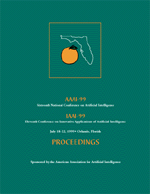Proceedings:
Proceedings of the AAAI Conference on Artificial Intelligence, 16
Volume
Issue:
Proceedings of the AAAI Conference on Artificial Intelligence, 16
Track:
Technical Papers
Downloads:
Abstract:
A central challenge of multiagent coordination is reasoning about how the actions of one agent can affect the actions of another. Knowledge of these interrelationships can help coordinate agents -- preventing conflicts and exploiting beneficial relationships among actions. We explore three interlocking methods that can be used to learn quantitative knowledge of such non-local effects in TAEMS, a well-developed framework for multiagent coordination. The surprising simplicity and effectiveness of these methods demonstrates how agents can learn domain-specific knowledge quickly, extending the utility of coordination frameworks that explicitly represent coordination knowledge.

AAAI
Proceedings of the AAAI Conference on Artificial Intelligence, 16
ISBN 978-0-262-51106-3
July 18-22, 1999, Orlando, Florida. Published by The AAAI Press, Menlo Park, California.
